











Welcome to the FREE Beyond the Panda resources exploring China, its language, culture, geography and wildlife. Giant pandas have left Edinburgh Zoo but the Beyond the Panda online resources are still here! Beyond the Panda is linked to Mandarin language learning and part of the RZSS 'Science in the Language Class' where you will find resources linked to Spanish, French, German, Italian, Portuguese, Japanese and Gaelic.
Beyond the Panda is organised in the section boxes below. However the games and activities can be used across all age levels. To help navigate to resources that will link to various language topics, please look at the Planning & Learning box.
For further information on any of the resources please contact education@rzss.org.uk
This section is organised into a three week progressive programme to use with upper primary level.
The red panda
Big and small
Introduction Part 1
Writing characters
There are many more activities and games about the red and giant panda in the other Beyond the Panda resources along with learning much more about the Mandarin language. Explore any of the section boxes to find out more.
Here are a few that might be of interest to start with:
Animals and their habitats
Mandarin Sentences
The hand
Introduction Part 2
Link to the IUCN red list
Threats
Introduction Part 3
There are many more activities and games about endangered animals in the other Beyond the Panda resources. Explore any of the section boxes to find out more. In particular take a look at the Eco-Learning section box.
Sounds are incorporated in the various online games where appropriate.
The files below contain a complete set of the sound files.
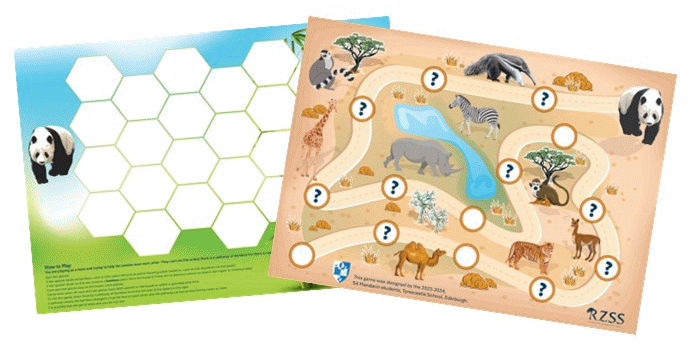
Giants compares two very different animals from two very different areas of the world. Learn more about the giant anteater from South America and the giant panda from China. The programme is designed to link to either Mandarin or Spanish. For the equivalent Spanish activities see - Science in the Language Class
 Students studying Mandarin from Tynecastle High, Edinburgh created the Mandarin sound files for the Giants project and also designed a fantastic game about the giant panda.
Students studying Mandarin from Tynecastle High, Edinburgh created the Mandarin sound files for the Giants project and also designed a fantastic game about the giant panda.
 Students studying Spanish from Musselburgh Grammar, East Lothian created the Spanish sound files for the Giants project and also designed a fantastic game about a tour around Edinburgh Zoo. There is a Mandarin version 欢迎来到爱丁堡动物园 below. The Spanish version is found at Science in the Language Class
Students studying Spanish from Musselburgh Grammar, East Lothian created the Spanish sound files for the Giants project and also designed a fantastic game about a tour around Edinburgh Zoo. There is a Mandarin version 欢迎来到爱丁堡动物园 below. The Spanish version is found at Science in the Language Class
Click on the + sign to hear the name in Mandarin along with some facts about the animals.
1. giant panda habitat game
2. giant anteater habitat game
3. Habitat, distribution and range maps
4. 欢迎来到爱丁堡动物园 Welcome to Edinburgh Zoo
 This game was designed by the 2021-2022 S4 Spanish Employability Group, Musselburgh Grammar School, East Lothian, Scotland. To download the Spanish version see - Science in the Language Class
This game was designed by the 2021-2022 S4 Spanish Employability Group, Musselburgh Grammar School, East Lothian, Scotland. To download the Spanish version see - Science in the Language Class
5. Giant pandemonium
 This game was designed by the 2023-2024, S4 Mandarin students, Tynecastle School, Edinburgh.
This game was designed by the 2023-2024, S4 Mandarin students, Tynecastle School, Edinburgh.
It is best if you work through all the other activities before taking this quiz.
Sounds are incorporated in the various online games where appropriate.
The files below contain a complete set of the sound files. One set is from the Tynecastle students and one set is a native Mandarin speaker.


Stripy Tails compares two different animals from two different countries. Learn more about the red panda from China and the ring-tailed lemur from Madagascar.
The programme is designed to link to either Mandarin or French. For the equivalent French activities see - Science in the Language Class
![]() Students from George Watson's College, Edinburgh provided the sound files and designed two fantastic board games. Thanks to the S4 Mandarin class for the sound files and the tangram games below. The Higher French class created the French sound files and designed a board game 'Lemurs and Ladders'. These can be found at Science in the Language Class
Students from George Watson's College, Edinburgh provided the sound files and designed two fantastic board games. Thanks to the S4 Mandarin class for the sound files and the tangram games below. The Higher French class created the French sound files and designed a board game 'Lemurs and Ladders'. These can be found at Science in the Language Class
The resources are aimed at upper primary level but also useful for lower secondary. See CfE links
Use the 'Directions with sound' to learn each compass direction and hear the sound.
Then use 'Directions' to test your knowledge of the characters and words.
Note for Mandarin - To learn more about the Chinese characters and Mandarin words for the threats then see 'Chinese characters - threats presentation'. It is also useful to work through the 'Chinese characters - habitats presentation' before the threats as there is some knowledge from the habitats presentation that you need to know to complete the threats activities.
Red panda and ring tailed lemur tangrams_Mandarin
![]() The red panda and ring tailed lemur tangrams were designed by the 2022-2023 S4 Mandarin class, George Watson's College, Edinburgh, Scotland.
The red panda and ring tailed lemur tangrams were designed by the 2022-2023 S4 Mandarin class, George Watson's College, Edinburgh, Scotland.
It is best if you work through all the other activities before taking this quiz.
Matching number flashcards which introduce many other animals from China and Madagascar.
Additional animal tangrams designed by 2022-2023 S4 Mandarin class, George Watson's College.
Note that penguins don't come from China!
Sounds are incorporated in the various online games where appropriate.
The files below contain a complete set of the sound files.
Cats compares the wildcat in Scotland with the Pallas's cat from China. The programme is designed to link to either Mandarin or Gaelic.
 Students studying Mandarin at Jordanhill School, Glasgow (2023-2024) have designed a wonderful board game about the Pallas's cat. The students have also provided the sound files for the online activities.
Students studying Mandarin at Jordanhill School, Glasgow (2023-2024) have designed a wonderful board game about the Pallas's cat. The students have also provided the sound files for the online activities.
 Students studying Gaelic from the eSgoil cohort have provided the Gaelic sound files. For the Gaelic resources please see Science in the Language Class
Students studying Gaelic from the eSgoil cohort have provided the Gaelic sound files. For the Gaelic resources please see Science in the Language Class
The cats are divided into different groups with different ancestors they have evolved from. This is called lineage.
 This game was designed by the 2023-2024, S4-S6 Mandarin students, Jordanhill School, Glasgow.
This game was designed by the 2023-2024, S4-S6 Mandarin students, Jordanhill School, Glasgow.
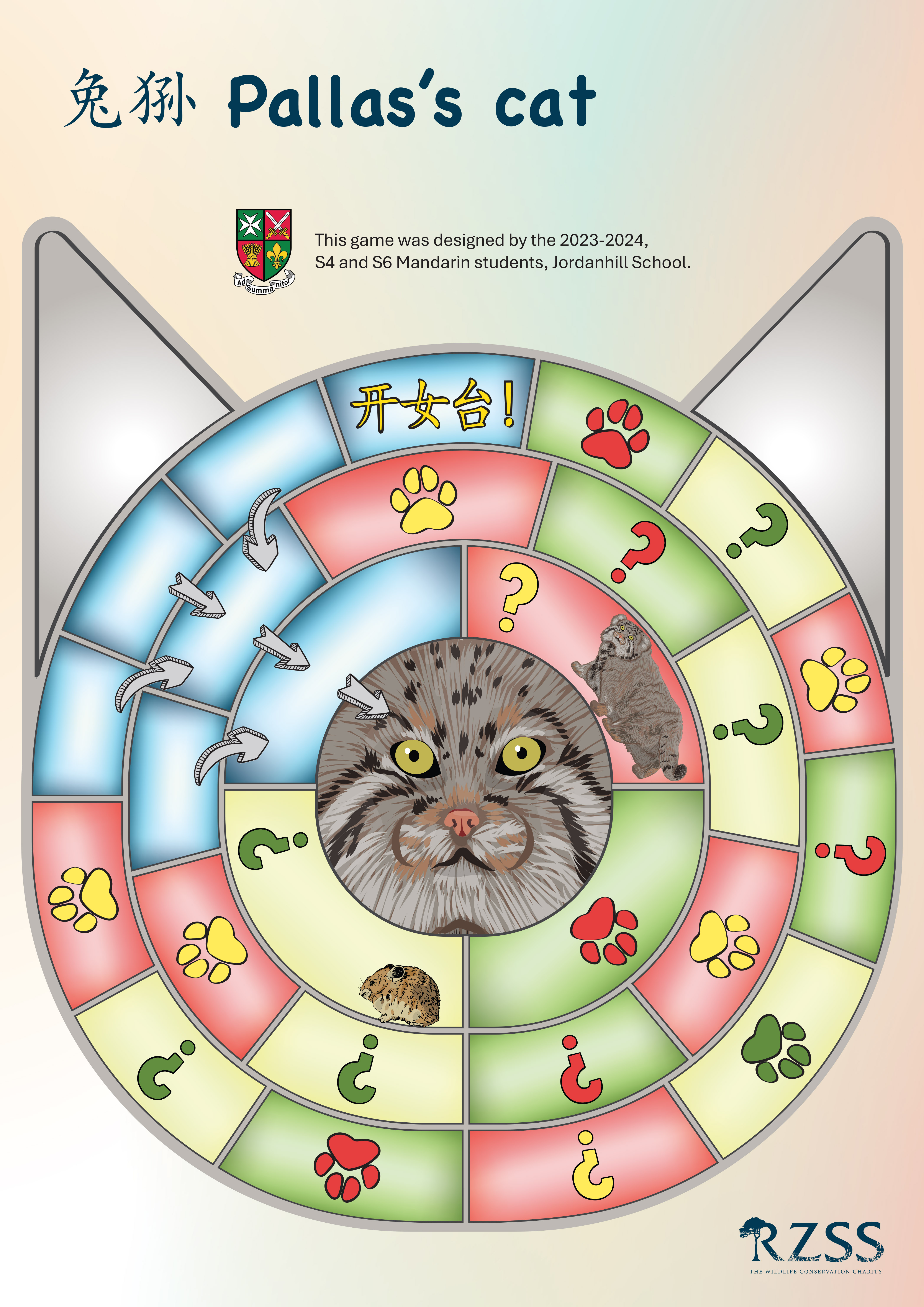
These activities and games are designed for community groups, families and home learning. A mix of activities all linked to Mandarin language learning for beginners.
Thanks to Confucius Institute for Scotland at the University of Edinburgh for supporting this section of Beyond the Panda activities.


This section will focus on the similarities and differences between the giant and red pandas. Their names in Mandarin literally mean big bear cat and small bear cat but please bear with me as
first we need to explore what animals are actually bears!
Before the 同 or 不同 activity:
1. Read the panda fact files.
2. Do the activity 'same and different'.
Then try this drag and drop game to place the words into the correct box depending on whether it is something that both pandas have the same or different.
Mandarin Mix will introduce some Chinese characters and words in each of its sections. You may find it helpful to read over these useful definitions.
The matching character game below uses the characters introduced in this 'Big & Small pandas' section.
After investigating the 'History of giant pandas', you might want to play the panda timeline game!


The Beyond the Panda habitat map is a very simple map representing the main habitats in China and placing these habitats where they mainly are. It shows only the two largest rivers. It was designed to only look at China and Taiwan so other surrounding countries are not included in this map.
This map is available to download - China habitat map
Of course, in the mountain area, there are forests and in the forest areas, there are grasslands and mountains. China is a very large country with different climates, different landscapes, many rivers and lakes and over 7,000 species of animals.
The matching character game below uses the characters introduced in this 'Biodiversity' section.
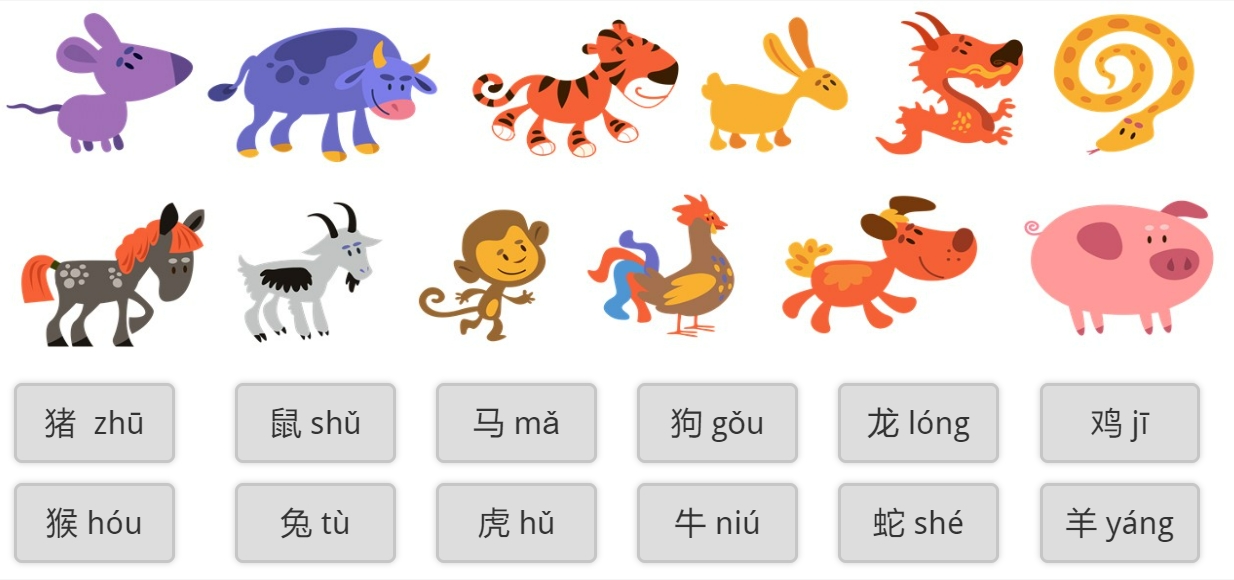

This programme introduces you to the Mandarin language and Chinese characters. Work through the presentations and videos in order.
Additional resources
Remember from session 1 (Characters), the ancient characters were drawings and even the simplest of them had much more meaning behind them.
Work through the following presentations (in order) to learn more about the links from the ancient drawings to the modern simplified characters.
This booklet provides a copy of some of the information and exercises should you wish to download a print version.
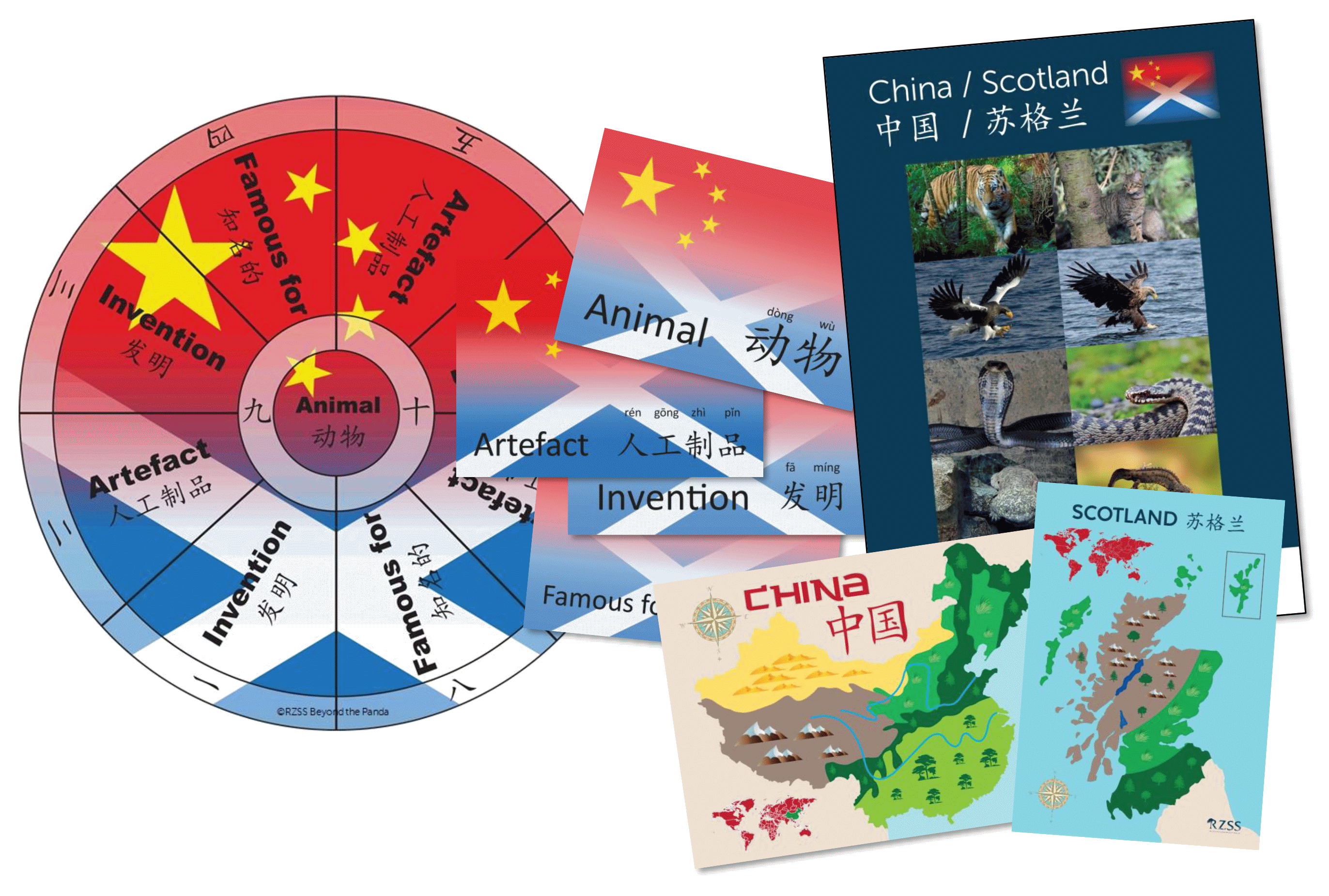
A comparison project between China and Scotland aimed at P4-P7 level which looks at the similarities and differences between the habitats and animals of each
country. The game also includes cultural items from China and Scotland.
Partnered with JASS, this can fulfil part of the 'Me and My World' section. This can further involve actions to help save endangered animals, for example: making bird feeders, bug hotels, raising money for RZSS projects in the wild.
The resources are available in two formats:
Click on the items below:
Although topic is aimed at upper primary level, the following 3 games could be introduced to lower primary:
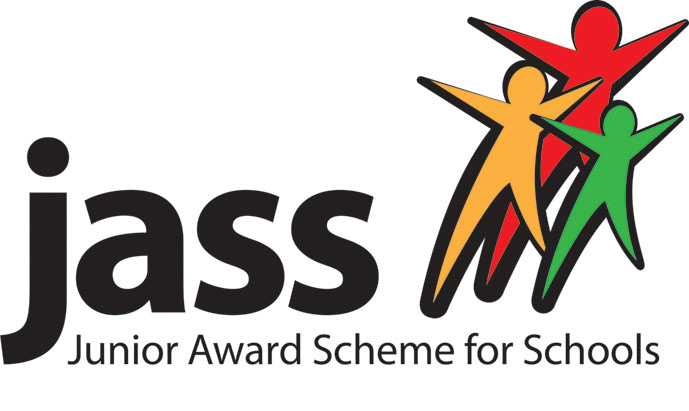
This project is supported by the Junior Award Scheme for Schools - JASS and can be used as part of the scheme.
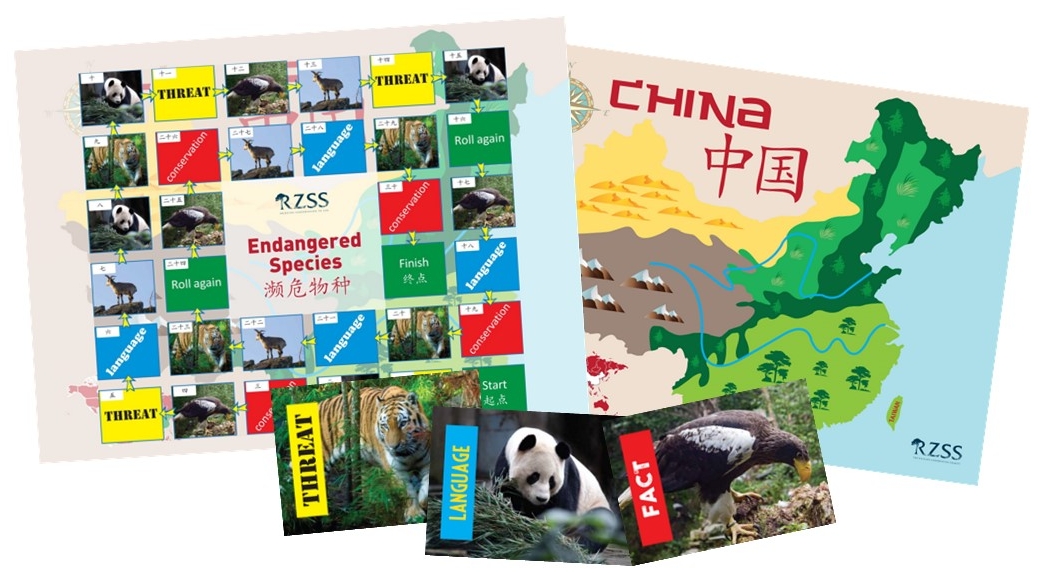
There
are many different threats facing animals across the world. For example:
habitat loss, over-hunting, pollution, invasive species, illegal pet trade,
over-exploitation and hybridisation. Climate
change is
also a main threat to all animals. Habitat loss, pollution, over-exploitation are
main contributors to climate change.
Various resources have been collated from Beyond the Panda to create a series of lessons around Chinese endangered species, mainly focusing on four threats: habitat loss, over-hunting, pollution and climate change.
This programme is part of the Confucius Institute for Scotland's Schools Eco-Learning Programme (ELP). The programme is a partnership between CISS, Keep Scotland Beautiful and RZSS Beyond the Panda. A detailed pack will be available from CISS.
This game focuses on four Chinese endangered animals and their four main threats: giant panda and habitat loss; Amur tiger and over-hunting; Steller's sea eagle and pollution; bharal and climate change.
For further information about the threats facing the animals within the endangered game:
A comparison project between China and Scotland which looks at the similarities and differences between the habitats and animals of each country.
The resources are available in two formats.
The Mandarin language often uses words that simply describe the meaning. Sometimes it can be a useful way to learn Mandarin words by recognising each individual character and its meaning.
The earliest form of Chinese writing is from around 4000 years ago. Simple drawings were found on animal bones. The Chinese characters have changed over time but we can sometimes use the ancient drawings to help us see pictures within the modern characters.
It is best to work through the habitats presentation before attempting the threats presentation.
Conservation related words and their definitions along with the Mandarin translations and sound files.
Additional teaching notes on Chinese characters.
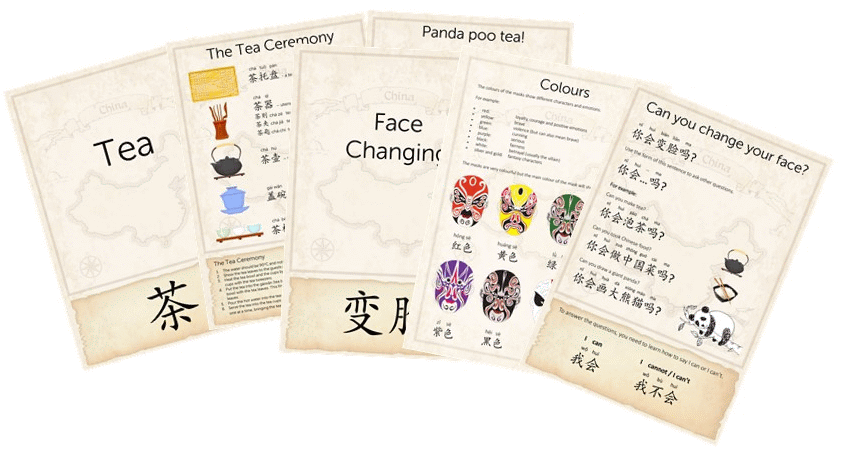
A fun matching game looking at ancient and modern simplified Chinese characters. There are four sets which are identical but with different colours should you wish to split the class into different groups.
Either download and print the card version or play the interactive game:
This is an advanced endangered species game which includes a Mandarin case study for qualification level.
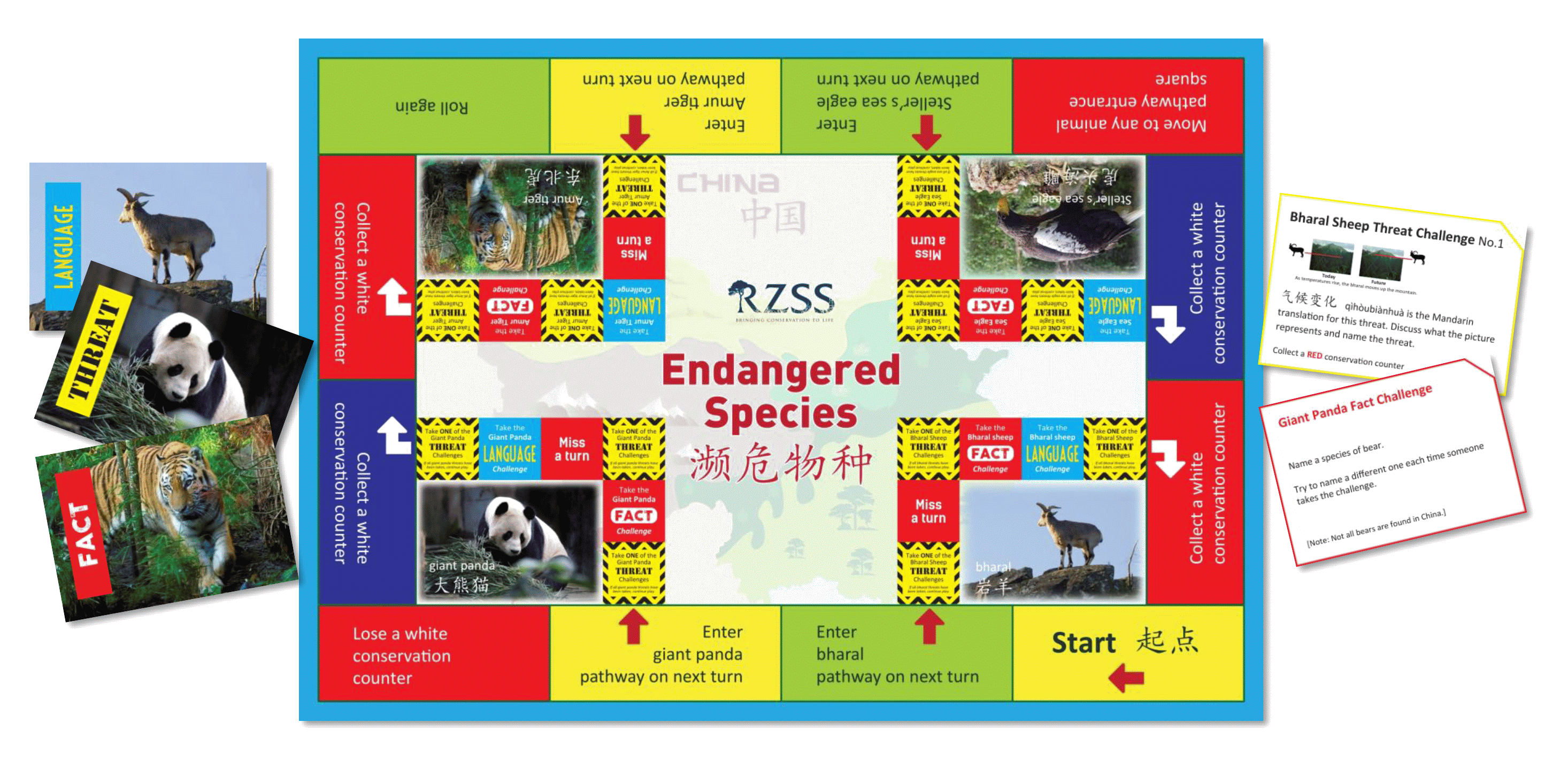
Teacher training video on how to play
Collating together some of the facts which can be learnt through the panda packs and other resources on this website.
StampIT also provides resources to assist with the Mandarin language. Visit their Mandarin section.
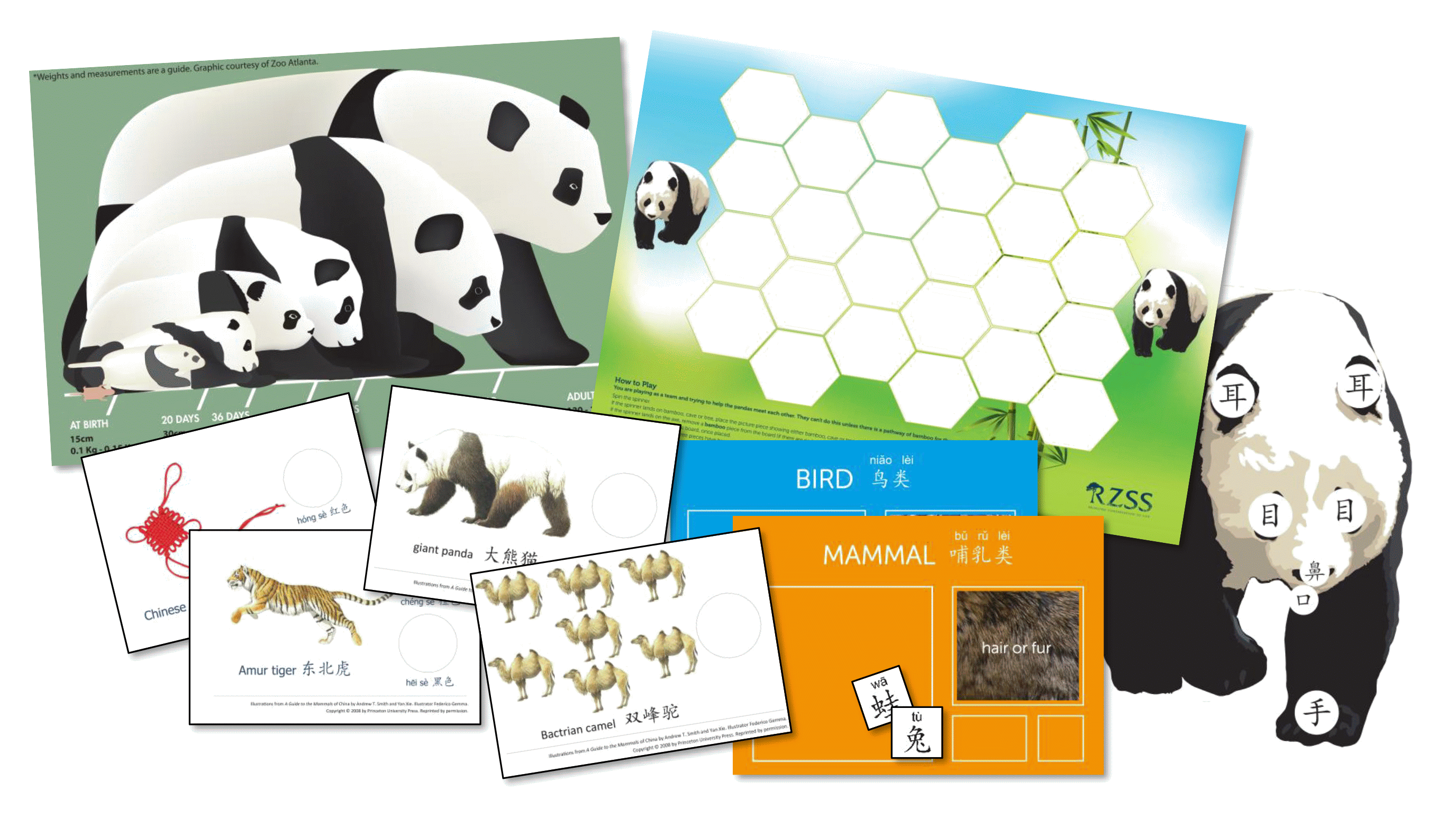
This pack includes a range of activities to learn about the giant panda, simple classification of vertebrate animals and to reinforce Mandarin numbers and colours.
Click on the items below:
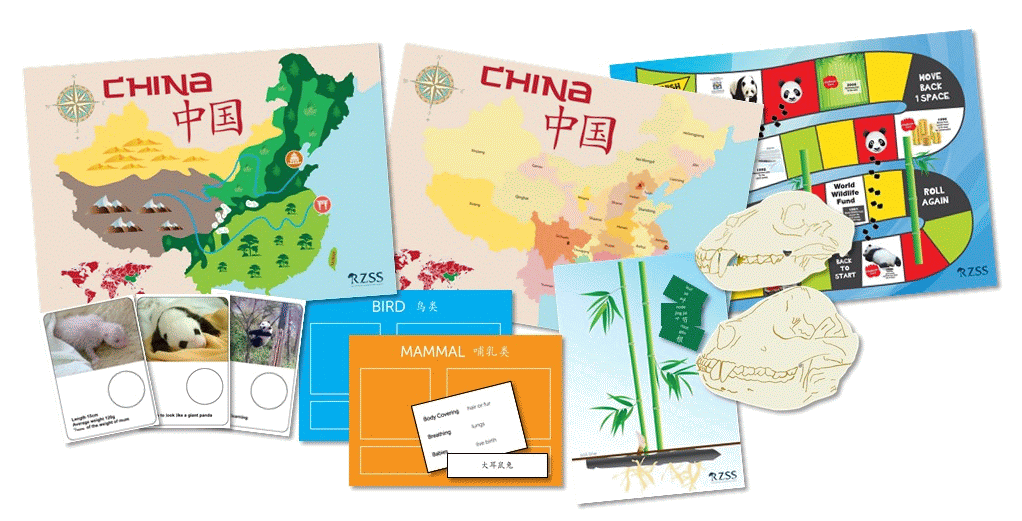
This pack includes a range of activities to learn about the giant panda, including the history of giant panda conservation, classification of vertebrate animals, habitats and regions of China.
Click on the items below:
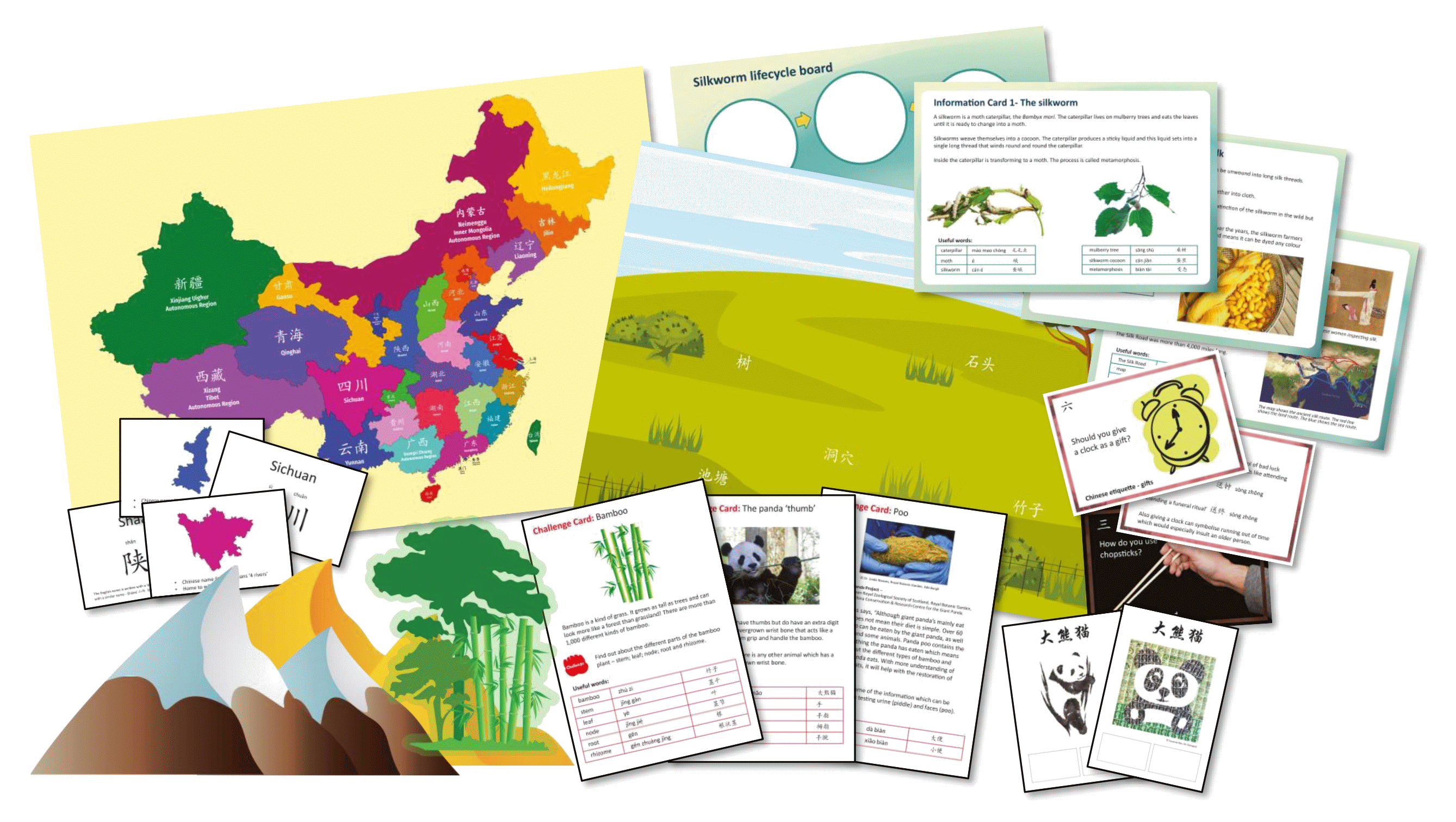
This pack includes a broad range of activities in science, art, history and culture.
Click on the items below:
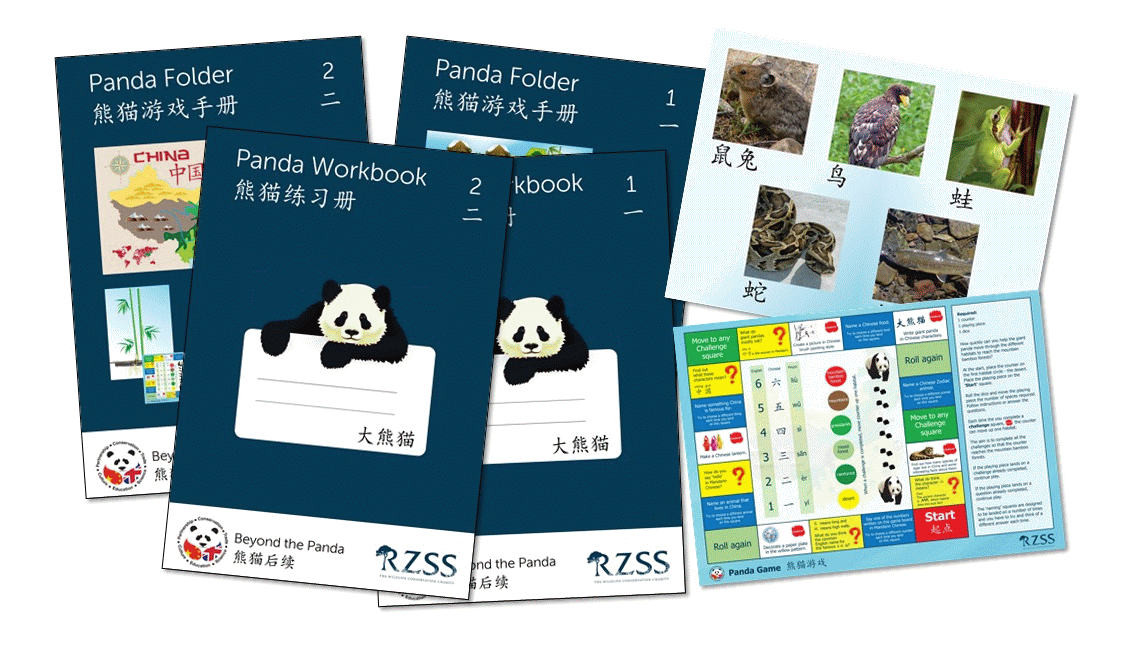
These packs have similar content to the Level 1 and Level 2 panda packs but have been designed as individual pupil workbooks instead of the group game activities which are in the panda packs. The panda folder is designed to be printed in booklet format, providing a double page spread for the maps and diagrams. If you cannot print in booklet format, the double spread pages are also provided as full pictures.
Click on the items below:
Interactive online games without the need for printing the materials can be found in many of the other sections within Beyond the Panda. Use the Planning and Learning section to find various topics.
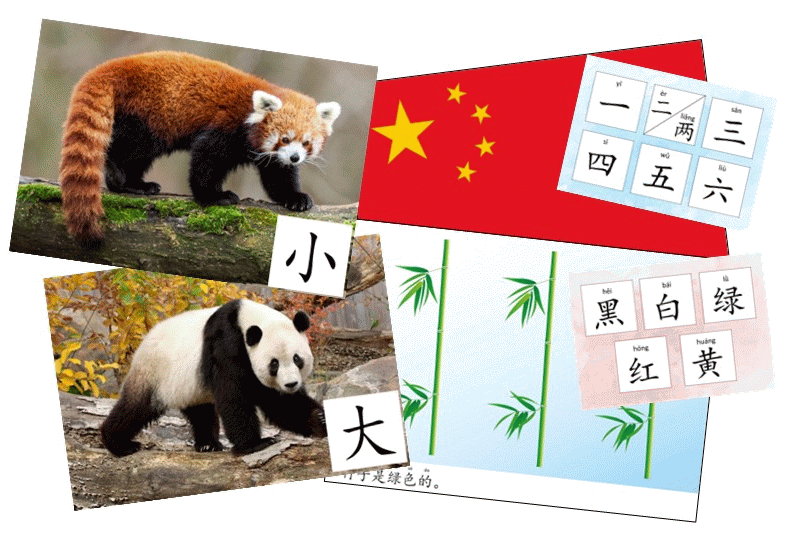
A short activity to recognise the characters for big and small using the red and giant panda names in Mandarin.
The following are character recognition activity stories. It is not expected that the children will understand the full Chinese sentences. The story books contain large pictures to help the children either count the items or see the colours. The number and colour cards are for the children to point to the correct characters and it is suggested that each child have a card while the story is being read.

Also see colour games in the Giants and Stripy Tails sections
Also see Body Parts in the Stripy Tails section
Also see Giants and Stripy Tails sections
Also see the Eco-Learning section
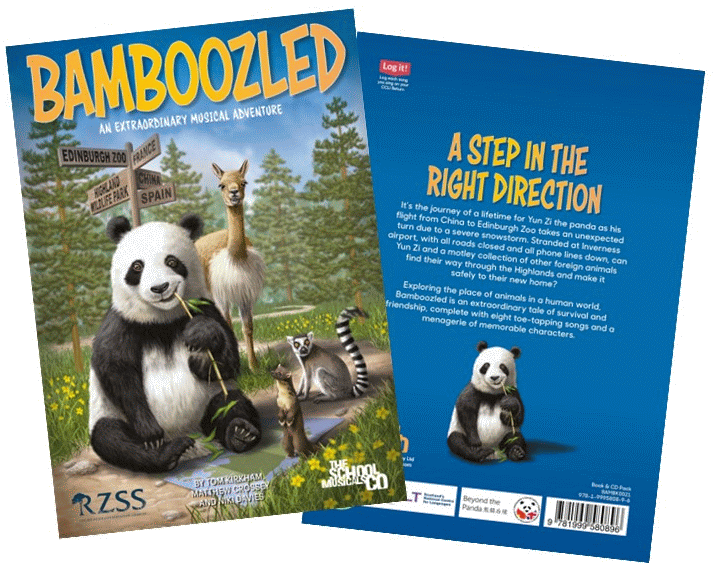
This is an extraordinary musical adventure written by The School Musicals Company in association with RZSS as part of the Beyond the Panda programme and supported by CISS.
It's the journey of a lifetime for panda Yun Zi as his flight to Edinburgh Zoo takes an unexpected turn due to a sever snowstorm. Stranded at Inverness airport, with all roads closed and all phone lines down, can Yun Zi - along with a motley collection of other foreign animals - find their way through the Highlands and make it safely to their new home?
The musical explores the place of animals in a human world, it is a tale of survival and friendship, complete with eight songs and a menagerie of memorable characters. The script also includes a few lines in French, Spanish and Mandarin as the animals try to communicate in the different languages from where they are from!All details about how you can perform the show are included in the book along with information for additional activities. Contact The School Musicals Company for copy.
IMPORTANT- If you wish to perform the play, you will also need to purchase a performance licence direct from The School Musicals Company. It is a small nominal fee and details are included in the book. It would also be much appreciated if you would credit both RZSS and The Schools Musicals Company in your performance.